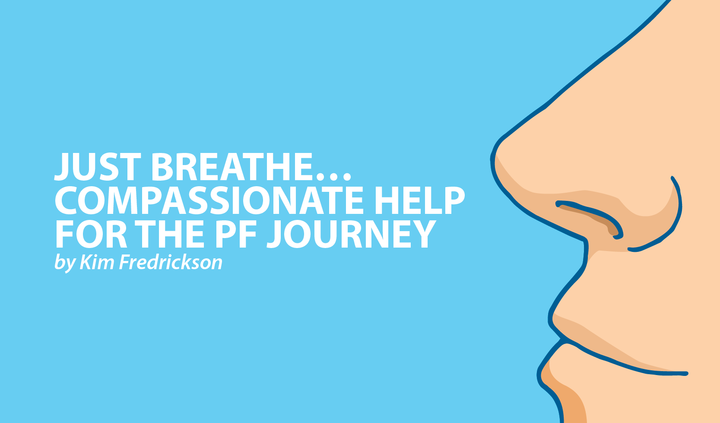Understanding Palliative Care
Written by |

Last week, my husband and I met with a palliative care nurse. A few weeks ago, I shared in another column my frustration with seeking palliative care. Our meeting with this nurse was very helpful. I’ll share what I learned, and I hope it will help you, too. Keep in mind that every service provider and healthcare system may have different standards and advice.
What is palliative care?
As a reminder, palliative care is treatment focused on relieving and preventing symptoms that are distressing. Receiving palliative care does not mean you cannot also receive curative care, such as participating in research studies, being evaluated for a lung transplant, and considering new medications. It is not hospice care, which is treatment administered in the last months of life. Palliative medicine involves a myriad of healthcare professionals who consider physical, psychosocial, and spiritual factors in their treatment approach.
Our nurse explained the factors that determine if a patient is eligible for palliative care. They look at whether a patient is able to perform basic activities of daily life (ADL), which are measures of independence. These are basic self-care tasks, including:
- Bathing and showering
- Personal hygiene (brushing teeth, combing hair, washing face)
- Being able to dress yourself
- Toilet hygiene (includes getting to the toilet, cleaning oneself, and getting up)
- Mobility, such as walking and getting in and out of a chair or bed
- Being able to feed yourself (doesn’t include cooking for self)
My situation
I explained that I was able to do all these things, but it was getting harder and harder to do so. She understood and said to watch for things like no longer being able to stand in the shower or needing help with any of the ADL above. She advised that when these start happening, I should talk to my primary care doctor and she will put in an order for palliative care (home care).
Our nurse also asked if I was still able to drive. I said yes, but I only go out about three times a week for doctor’s appointments or to go to the grocery store. This is because going out is so tiring for me. She said that once I’m no longer able to drive, this is another trigger to initiate palliative care.
What to expect?
The goal of palliative care is to increase the patient’s quality of life. According to GetPalliativeCare.org, “You can expect relief from symptoms such as pain, shortness of breath, fatigue, constipation, nausea, loss of appetite and difficulty sleeping. Palliative care helps you carry on with your daily life. It improves your ability to go through medical treatments. It helps you better understand your condition and your choices for medical care. In short, you can expect the best possible quality of life.”
For more information, download a copy of an informative handout here.
Who’s on the team?
Your palliative care team can include doctors, nurses, home health aides, social workers, and other specialists, as well as your primary care doctor.
How can it help with PF?
As you know, pulmonary fibrosis has many symptoms that are difficult to manage such as shortness of breath, a dry cough, exhaustion, aching muscles, body pain, muscle cramps, depression, anxiety, and unexplained weight loss.
Medications and treatments can relieve some of these symptoms, which makes what we are going through so much easier. My philosophy is to embrace anything that can make this journey easier. Bring it on!
Help for our loved ones
Palliative care can help our loved ones, too. They have difficulties of their own and can benefit from someone to answer questions, provide a listening ear, and provide resources. They can help with what to expect in the future, as well as future planning.
I hope sharing what I’ve learned was a help to you. When I explained to the nurse how frustrating it had been to get specific information from my doctors, she said she hears that a lot, adding, “If you have questions, just ask a nurse.” This proved to be very true. Our doctors are focused on helping us with treatment, but may not look through the lens of what we need for quality of life.
What do you think?
I’d love to hear your response to this column. Do you have any experience with palliative care? What was it like? What was helpful to hear about? Please leave a comment below, and share with those who could benefit via email or on social media. We’re in this together!
***
Note: Pulmonary Fibrosis News is strictly a news and information website about the disease. It does not provide medical advice, diagnosis, or treatment. This content is not intended to be a substitute for professional medical advice, diagnosis, or treatment. Always seek the advice of your physician or other qualified health provider with any questions you may have regarding a medical condition. Never disregard professional medical advice or delay in seeking it because of something you have read on this website. The opinions expressed in this column are not those of Pulmonary Fibrosis News or its parent company, Bionews Services, and are intended to spark discussion about issues pertaining to pulmonary fibrosis.








Roger Wenschlag
Thanks for the column on palliative care. I just volunteered for a study at the University of Minnesota, Interstitial Lung Disease Program. The study is designed to determine whether or not palliative care sooner in a patient's IPF journey has a positive effect on the disease's progression. The hypothesis is that it does. I hope so!
Kim Fredrickson
Thanks for sharing Roger. I hope your experience in the study goes well. What a wonderful opportunity!
John Churchill
I was in palliative care and found the service useful, educational and very comforting but in March 2017 I was hospitalized with severe respiratory distress. In September I was discharged from the hospital to home hospice care. I believe that I will stay in hospice care for a while but hope that I will not meet the criteria for continued hospice care indefinitely. In that event, I hope to return to palliative care.
My diagnoses are idiopathic pulmonary fibrosis (6 years), atrial flutter and severe peripheral neuropathy. I am able to dress myself, carry out personal and toilet hygiene and transfer from bed to wheelchair to chair. I use O2 at 6 lpm at rest and up to 15 lpm when carrying out these activities.
I continue to strive to be independent. The greatest benefit that I have received from both palliative and home hospice care is the comfort derived from the knowledge that my team is there and will respond to my needs when requested without being forever "on my shoulder" thereby allowing me the semblance of independence.
Kim Fredrickson
Hi John,
Thanks so much for sharing your experience. I love your fighting spirit! So appreciated you sharing how comforting it is to know you have a team behind you that will help, but not too much. You keep going! I'll bet you'll be back on palliative care soon! Tak Care.
Robert Ketchabaw
Hi. Kim I just want to thank you for your articles and the time you spend to help myself and those like me, that feel we can do it alone and don't want to bother others. My eyes and heart open each time I read your content. Thanks so much. Ketch
Kim Fredrickson
Hi Robert,
Thanks so much for your encouragement. I'm so very glad my columns speak to your heart and are helping you. We all need one another as we walk this difficult road.
Robert
Thank you for reply, hope your doing ok. Know you have great caregiver,all the best for the season. ketch
salvo
no I have no experience, but I know that I worked in the theater, I was an actor, now I feel useless, not alive but well, I wait for a phone call, from the transplant center in Palermo Italy, but the years pass, now I'm waiting for a compatible donor for two years , but I take care with pirfenidone, I wait aspect, but what?
Kim Fredrickson
Salvo, Thank you so much for your comment. I know it is so hard to not be able to do what we've been trained to do, and love. You are grieving, my PF friend. I'm so glad you are on a transplant list. So sorry it has been so hard. Such a long time to wait. Please hang in there and don't give up.
salvo
Only now I have had the courage to face publicly MY DISEASE: about my disease, few people know that it is anyone who is waiting for transplant. It is not easy for me to talk about it ... or rather I think it's difficult. , IPF (idiopathic pulmonary fibrosis), not everyone knows things, what harm is that? Yes, then they see you that externally you're fine, and they say; we are sorry but then ..., but then so I said so much to me not interested "Today instead I find myself having to deal with that speech in first person ... But it is not easy. The disease has a sense, a size, a step, even the disease and 'life matrix.Ecco, I'm here on my knees waiting for an angel to lightly touch me with grace
Kim Fredrickson
Salvo,
Thanks for being so brave to acknowledge your disease. It is so very hard, especially when others do not understand IPF, or know what to say. Turning to God for comfort and grace is what sustains me. Saying a prayer for you.
Kevin Haselhorst, MD
Hi Kim
No truer words were written " . . doctors are focused on helping us with treatment, but may not look through the lens of what we need for quality of life."
As an ER physician, patients come to me for treatment - not palliative care. Chronically-ill patients need palliative care along with medical care. We need to stop lumping palliative care with medical treatment. Palliative care promotes wellness through using you right brain's belief that 'less is more.' Medical care treats illness by using your left brain's belief that 'more is better.' Most patients reach the point where they no longer prefer to be admitted to the hospital. The purpose of palliative care is to give patients permission and resources to be cared for at home rather than the hospital. Respecting their wishes offers them compassion.
Kim Fredrickson
Thanks Dr. Kevin,
Love your comment and clarification. Both types of treatment are so valuable when applied correctly. Thanks for weighing in and sharing your expertise with us.
Helen
Just diagnosed, in denial as healthy all my life! 90 years old, know I have to die of something but never thought I may have to use oxygen!
Would like to stay in home, but ... on reading what happens, may not be option! Any thoughts?